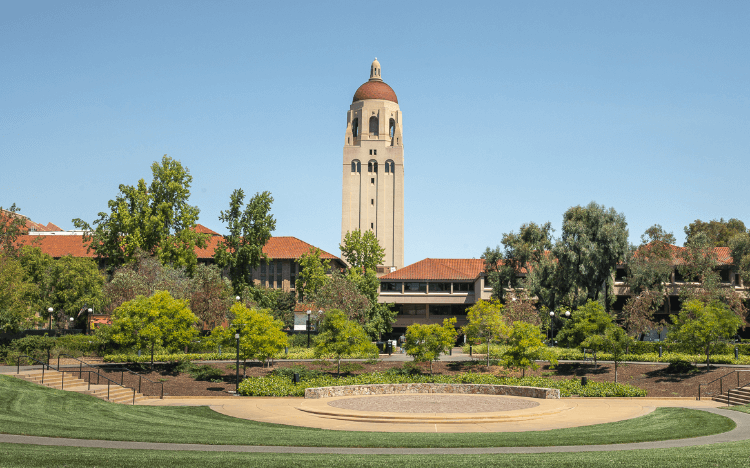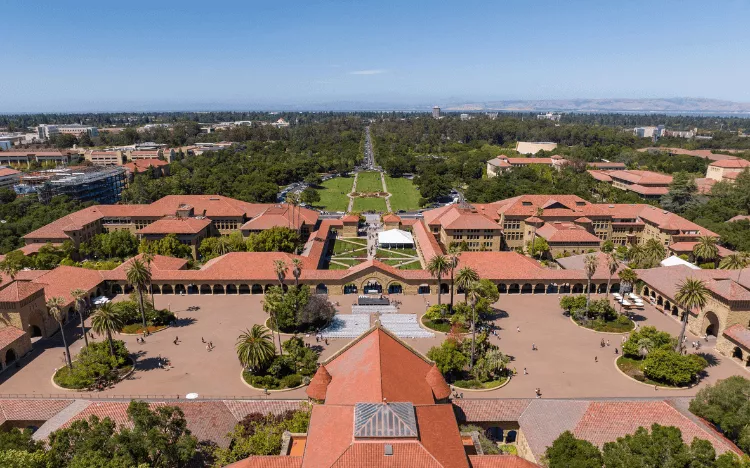It’s always difficult to guesstimate the GMAT score you need to apply to Harvard Business School (HBS), without sight of the rest of your application. Like all business schools, Harvard will consider your application holistically.
Your GMAT exam score forms part of your MBA application, which includes your resume, references, academic transcripts, and essays. Although a good GMAT score is not a guaranteed ticket to Harvard, it certainly helps your application.
So, what GMAT score should you aim for?
READ: GMAT Score Range For Top Business Schools Like Stanford & Harvard

©Stanford University / Facebook
Harvard MBA average GMAT
According to the latest Harvard MBA class profile, 63% of the Harvard MBA class of 2026 took the GMAT. A look at the MBA class average GMAT score for Harvard is a good place to start to get a ballpark figure of what GMAT score you should aim for when applying to the school.
As of 2024, GMAT exam scoring has changed as part of a number of core updates to the exam. Understanding GMAT score percentile ranking can help you calculate how previously reported scores compare with the current scoring system.
Harvard reports its class median, rather than average, GMAT score. The median GMAT for the HBS class of 2026 was 740, which is in the 96th percentile, making its relative competitiveness similar to that of scores between 685 and 695 within the current scoring system. This gives you an idea of where you are, at least in terms of your competitiveness around the GMAT exam.
Harvard’s median GMAT is one of the highest in the world—its closest competition is the Stanford MBA, which has a class average GMAT of 738, which is also in the 96th percentile.
However, it's clear from the Harvard GMAT score range that an application with a GMAT exam score that's in the bottom half of test scores will also have a chance of being accepted, provided the rest of your application is exceptional.
READ: Average GMAT Scores For The World’s Top MBA Programs
©Wirestock/iStock
Harvard GMAT range
As well as looking at average GMAT scores for Harvard, it makes sense to look at the GMAT range for the business schools you apply to. The GMAT range tells you what both the lowest and highest-scoring students in an MBA class earned on their GMAT exam
Harvard’s GMAT score range for the MBA class of 2026 is 540 to 790, based on the previous GMAT scoring system. This means Harvard accepted at least one application with a score that was in the bottom 32% of test takers, as well as an application that was at the top 100th percentile. Scores with relative competitiveness on the current GMAT scoring system range from 515 at the lowest end of the range to anywhere between 775 and 805 at the highest.
Many of the world’s best business schools admit students with lower-than-average scores. Shaifali Aggarwal, HBS alumna and founder of Ivy Groupe, a boutique MBA admissions consultancy, says she’s seen candidates overcoming weak GMAT scores by demonstrating strength in the other areas that HBS values—namely, a ‘habit of leadership’ and ‘engaged community citizenship’.
“The GMAT score by itself will not get a candidate admitted to HBS. Who an applicant is holistically is much more important,” she says.
It is important to take an honest look at your MBA application as a whole to gauge how competitive you might be in terms of the areas that HBS values in applicants. It’s also worth noting that there is no minimum GMAT score requirement to apply.
However, as a rule, you should be aiming to score on the higher end of the GMAT range if you want to stand a better chance of being accepted into your target school.
Harvard GMAT score: Key points to remember
There are two important pieces of advice that admissions consultants, the HBS MBA admissions team, and alumni have shared over the years when it comes to applying to Harvard.
The first, from MBA admissions consultants, is quite practical: Apply to a vertical list of schools. That means choosing to apply across schools with different levels of competitiveness (with your specific application).
Bear in mind that Harvard Business School has one of the most competitive programs with an acceptance rate of about 13%. These numbers show that remarkable people are rejected from HBS all the time. Go for it, but don’t put all your eggs in one basket.
The second piece of advice is from HBS MBA admissions and alumni: don’t self-select out. There are a lot of misconceptions about the type of person and profile that Harvard is looking for. Some of the most capable and interesting applicants tend to underestimate themselves and are plagued by impostor syndrome.
Don’t drop out of the race before it starts. Be authentic in your application. Put your best foot forward, but make sure you tell your story, as opposed to the story you presume the admissions committee wants to hear.
The GMAT is an important part of that story, but it’s not everything.
The data in this article is updated annually and relevant for the current Harvard MBA class of 2026



